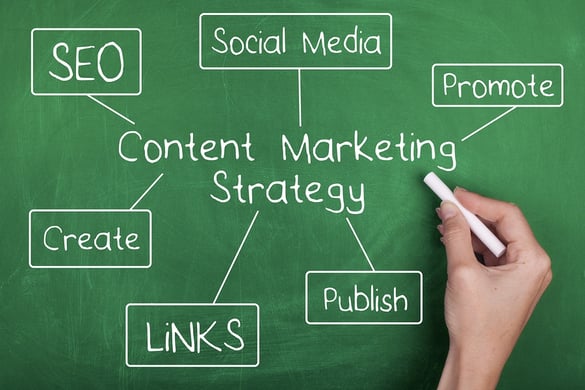
To thrive in today’s competitive environment, small businesses are experimenting with content and various publishing platforms to find new ways to get ahead. With more creative tools available than ever before – small business owners face a complex environment of opportunities and challenges.
From the outset it’s important to note that there is a myriad of free and cost-effective tools that will support your content marketing efforts. What works for one company may not necessarily work for another. Setting clear objectives and developing a strategy for what you want to achieve from your marketing efforts will help you find the right mix of tools to help you achieve success.
Why Is Content So Important?
Well, Research Tells Us That:
- 70-90% of the buyers journey is complete prior to engaging a vendor (Forrester)
- Consumers engage with 11.4 pieces of content prior to making a purchase (Forrester)
- Consumers are 5x more dependent on content than they were 5 years ago (Nielsen)
Here’s 6 Things Every Small Business Owner Should Know About Publishing Online Content.
1. Publish Great Content, Regularly. Then Amplify It
Search engines love nothing more than fresh, quality content produced frequently. There’s a saying in the industry that goes ‘Content is King’. And it’s true. It’s a signal that your website it legit. Google even has a specific algorithm that will score your website based on the freshness of its content.
And ‘content’ doesn’t belong solely to the realm of words. While blogs are the most common way to produce fresh content frequently, it can also include videos, photos and audio. Any content that can be indexed by search engines contributes to your SEO. It’s time to start thinking of yourself as a publisher and your website as your platform. Invest in your blog, build an event calendar, integrate your social media platforms and get creative with video and audio content.
Keep in mind that producing quality content is only half of the equation. If you make that content shareable via social media, and send out the links via Twitter, Facebook, LinkedIn and other channels, you’re well on the way to achieving great SEO results.
2. Be Patient. The Best Results Take TimeContent marketing is a way to share your expertise and build customer relationships over time. It’s an opportunity to create great content offering advice, sharing information and answering common questions about your industry. The results aren’t always immediate, but they are compelling.
Research has found that companies that blog generate 67% more leads per month than those that don’t. In addition, Axonn (formerly known as ContentPlus) discovered that content produced via inbound marketing give websites 434% more indexed pages and 97% more indexed links, which is SEO gold. In simple terms, inbound marketing directs more traffic to your website, making it a powerful tool in lead generation.
3. ‘Email’ Is Not A Dirty WordContrary to what you may believe, email marketing remains a trusted marketing avenue amongst consumers. This can be attributed to the way people can now organise their emails and sort through them at their own leisure. Consumers are familiar with email and it’s one forum where they feel a greater sense of control. So much so that research from Experian states that for every $1 invested in email marketing it can create up to $44.25 in return. It’s for this reason Email Marketing still needs to form part of your digital marketing strategy.
Firstly, under no circumstances should you buy an email list and spam the subscribers. Those shady days of digital marketing are long gone and companies found guilty of such practices can face severe penalties.
Instead marketers need to build an opt-in list of subscribers who have volunteered their email address because they know that helpful and useful content is going to be delivered to them.
4. It’s Okay To AutomateOverwhelmingly, small businesses and CMOs are turning to marketing automation to streamline their efforts and achieve greater ROI. Marketing automation refers to software that automates repetitive tasks such as emails, social media, and other website actions, making them more efficient and less labour intensive.
Popular tools include:
- HubSpot
- Pardot
- Marketo
5. If You Can’t Measure It, You Can’t Manage It
“Measurement is what makes marketing a science, rather than a superstition,” says Forbes Marketing expert Jayson DeMers. “For many business owners, marketing is a superfluous expense – something to spend money on only when the budget is flexible enough to accommodate it.”
Metrics are essential to making informed content marketing decisions, and ensuring that you’re investing your time, money and resources into platforms that are reaching your ideal customers. Metrics are the roadmap that lets you know if your if your blog is a lead conversion black hole, or if your YouTube channel has the highest conversion rate at the lowest customer acquisition cost, making it far more worthy of your time.
6. SEO and Content Marketing Work Hand-in-HandThere’s a lot of articles out there pitting SEO and Content Marketing as bitter rivals, claiming that one is more important than the other. However, savvy marketers and business owners know that SEO and content marketing are like ice cream and sprinkles: they work perfectly together.
Great content should be naturally optimised to reach the people who want to read it. It positions your business as a leader in the field, creating trust and respect in the market.
It should also be built around a solid content marketing strategy, designed to give people the relevant material they want. By combining great content with solid SEO techniques made shareable via social media, you will gradually build organic visitors to your site. With this approach, you’ll improve your SEO rankings — but even better, you will have created an authoritative, relevant website that people will want to visit.


